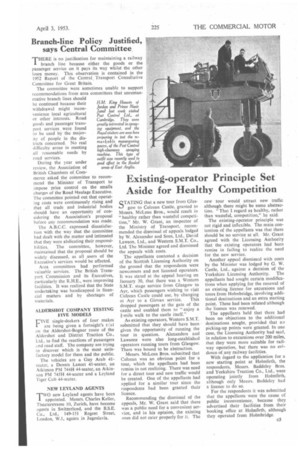Existing-operator Principle Set Aside for Healthy Competition
Page 41

If you've noticed an error in this article please click here to report it so we can fix it.
QTATING that a new tour from Glas gow to Culzean Castle, granted to Messrs. McLean Bros., would result in "healthy rather than wasteful competition," Mr. W. Grant, an inspector of the Ministry of Transport, recommended the dismissal of appeals lodged by W. Alexander and Sons, Ltd., David Lawson, Ltd., and Western S.M.T. Co., Ltd. The Minister agreed and dismissed the appeals with costs.
The appellants contested a decision of the Scottish Licensing Authority on the ground that the respondents were newcomers and not licensed operators. It was stated at the appeal hearing on January 30, that there was a Western S.M.T. stage service from Glasgow to Ayr, which passengers wishing to visit Culzean Castle could use, by changing at Ayr to a Girvan service. This dropped passengers at the gate of the castle and enabled them to "enjoy a 1-mile walk to the castle itself."
As existing operators, Western S.M.T. submitted that they should have been given the opportunity of running the tour in question. Alexanders and Lawsons were also long-established operators running tours from Glasgow. There was bound to be abstraction.
Messrs. McLean Bros. submitted that Culzean was an obvious point for a tour, which the appellants had been remiss in not realizing. There was need for a direct tour and new traffic would be created. One of the appellants had applied for a similar tour since the respondents had been granted their licence.
Recommending the dismissal of the appeals, Mr. W. Grant said that there was a public need for a convenient service, and in his opinion, the existing ones did not cater properly for it. The new tour would attract new traffic although there might be some abstraction. "That I regard as healthy, rather than wasteful, competition," he said.
The existing-operator principle was not rigid and inflexible. The main contention of the appellants was that there should be no service at all. Mr. Grant agreed with the Licensing Authority that the existing operators had been remiss in failing to realize the need for the new service.
Another appeal dismissed with costs by the Minister was lodged by G. W. Castle, Ltd., against a decision of the Yorkshire Licensing Authority. The appellants had sought certain modifications when applying for the renewal of an existing licence for excursions and tours from Holmbridge, involving additional destinations and an extra starting point. These had been refused although the licence was renewed.
The appellants held that there had been no objections to the additional destinations sought, provided that no picking-up points were granted. In one case, the Licensing Authority had said, in relation to excursions over 200 miles, that they were more suitable for railway operation, but there was no evidence of any railway facilities. With regard to the application for a new starting point at Holmfirth, the respondents, Messrs. Baddeley Bros. and Yorkshire Traction Co., Ltd., were operating jointly from Holmfirth, although only Messrs. Baddeley had a licence to do so.
For the respondents it was submitted that the appellants were the cause of public inconvenience, because they advertised their facilities from their booking office at Holmfirth, although they operated from Holmbridge.




























































































